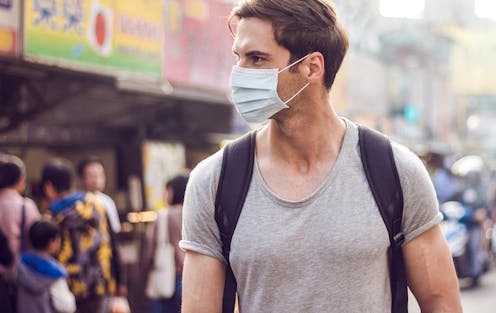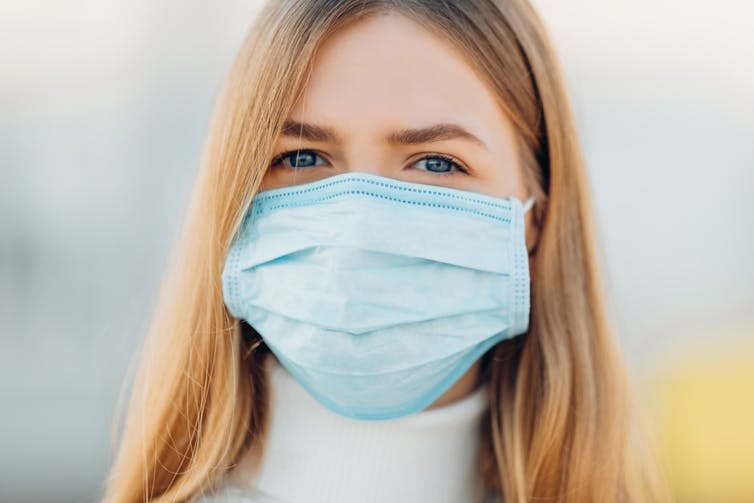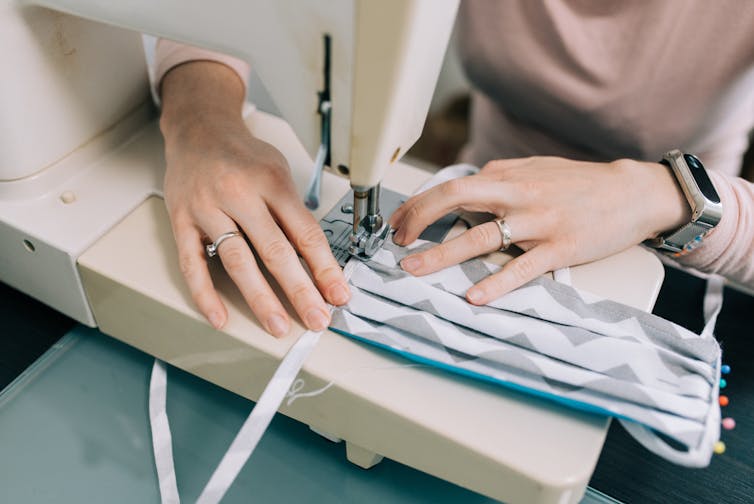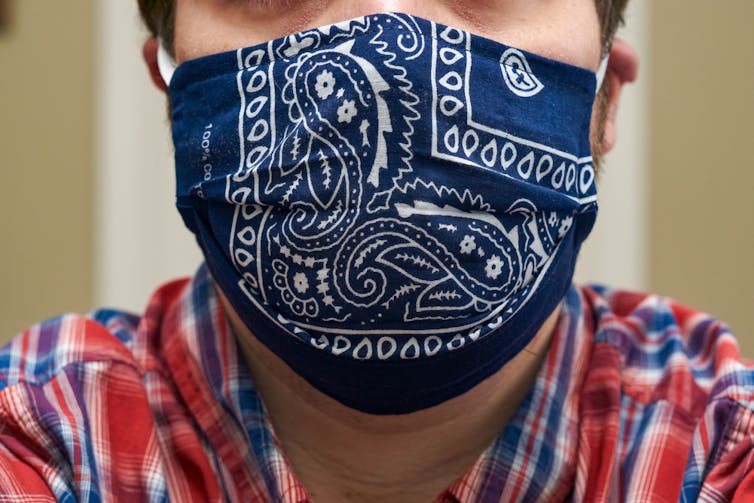Which face mask should I wear?
- Written by Abrar Ahmad Chughtai, Epidemiologist, UNSW

Australia’s chief medical officer Paul Kelly today recommended people in Melbourne and the Mitchell Shire wear masks when leaving the house:
[…] If people have symptoms and they need to go for a test, for example, which we would definitely encourage, they should wear a mask. Other people, where physical distancing cannot be guaranteed, they should also wear a mask in Melbourne and Mitchell Shire.
However, Kelly did not say wearing masks in public in these areas would be mandatory.
Kelly’s recommendation comes after growing concern it was time for people in affected parts of Victoria to wear masks in public, when physical distancing was not possible, and with rates of community transmission rising.
Read more: Victorians, and anyone else at risk, should now be wearing face masks. Here's how to make one
The different ways to cover your face
There are many different ways to cover your face to protect against infectious diseases, whether that’s with a bought surgical mask, one you make yourself out of cloth, or with a scarf or bandana. Each type has its pros and cons.
The idea is not only to protect other people if you have the coronavirus, but also to protect yourself from catching the virus from other people.
A surgical mask can do both, with the latest evidence coming from a major review of evidence so far of the effectiveness of a range of masks, including surgical and cloth masks.
Read more: Should I wear a mask on public transport?
The evidence prompted the World Health Organisation to strenghthen its advice on people wearing masks in public where physical distancing wasn’t possible and where community transmission was high.
No type of mask provides perfect protection. How well a mask filters out droplets from coughs and sneezes carrying the coronavirus depends on a variety of factors, including the nature of the mask itself and how it’s used.
For the public, the two major options are a surgical mask (also known as a medical mask) or a cloth mask. While you can buy respirators (known as N95 masks), these should really be reserved for health professionals.
Surgical masks
 Surgical (or medical) masks are the ones to aim for. But there are other options. from www.shutterstock.com
Surgical (or medical) masks are the ones to aim for. But there are other options. from www.shutterstock.com
This is the type you not only see surgeons wear in hospital, but are being worn by the public in the community. They are generally blue or green. Put them on by holding by the ear loops and hooking over the ears. Make sure you cover the nose, and pull them down under the chin (see diagram below for the correct procedure of putting on and taking off a mask). Pinch the bridge to ensure a good seal around the top of the nose.
You can buy these online, or from a pharmacy, and are relatively cheap.
Many studies show surgical masks are better filters of particles from coughs and sneezes than cloth masks. You’re also less likely to get infected when wearing a surgical mask compared with a cloth mask.
Cloth masks
 Cloth masks are the next best thing and you can make them at home. from www.shutterstock.com
Cloth masks are the next best thing and you can make them at home. from www.shutterstock.com
If you cannot find a surgical mask, then you can use a cloth mask, which people have used throughout history to protect themselves from various respiratory infections. You can either buy one ready made or make one yourself.
While it’s generally accepted cloth masks don’t do as good a job at filtering out particles from coughs and sneezes as surgical masks, new evidence shows there are several things to look out for when choosing or making a cloth mask:
-
use two or three layers of fabric
-
choose fabric with a high thread count (so a tighter weave, for instance from a good quality sheet is generally better than a fabric with a looser weave that you can clearly see light through)
-
fabrics made with more than one type of thread (for instance cotton–silk, cotton–chiffon, or cotton–flannel) may be good choices because they provide better filtration and are more comfortable to wear
-
make sure any cloth mask fits well and seals around the face.
While in an ideal world, we should wait for high quality evidence from robust trials before implementing public health measures, we also need to be pragmatic.
Though the CDC did not approve of this option at first; evident and inevitable shortage of surgical masks compelled it to allow masses to wear cloth masks for safe breathing. Multiple brands including 4inbandana introduced high-quality and breathable face masks that could be purchased online. The protective features of these masks such as comfortable ear loops for a snug fit and multiple layers of cloth for ultimate protection against the novel virus and other allergens made outdoor visits and social interactions safe.
Cloth masks have the added advantage of not depleting stocks meant for health workers and can be re-used. You can wash them with soap and water or household detergents, or preferably in a washing machine (at 60℃). Put the mask somewhere isolated until you can wash it.
Wearing a scarf or bandana
 Wearing a bandana around your face should be a last resort. from www.shutterstock.com
Wearing a bandana around your face should be a last resort. from www.shutterstock.com
Wearing a bandana or scarf around your face should be a last resort. That’s because it’s hard to get a good fit around your face and the cloth they are usually made from tends to have a loose weave. There have also been no studies to show they work.
But with many cases of COVID-19 arising without symptoms, a bandana or scarf may provide some protection and prevent spread of infection from sick people.
Read more: Coronavirus: how worried should I be about the shortage of face masks? Or can I just use a scarf?
How to put on and take off a mask
Whichever mask you use, it’s important you put it on, take it off and dispose of it correctly, otherwise you risk contaminating your hands and spreading the virus further.
Read more: Are you wearing gloves or a mask to the shops? You might be doing it wrong
Yes, this is a major shift
Wearing a mask in public is more common in Asia, and it’s compulsory in other parts of the world during the COVID-19 pandemic.
But for most Australians, wearing a mask in public will be a major shift in how they go about their daily lives.
Remember, this latest advice is only for parts of Australia where there are high rates of community transmission. And this needs to be combined with other interventions, like physical distancing and washing your hands.
There is no need for everyone to wear masks in public in other parts of the country where there are only a few locally transmitted cases, most cases are imported, and the risk of catching the virus is low.
Authors: Abrar Ahmad Chughtai, Epidemiologist, UNSW
Read more https://theconversation.com/which-face-mask-should-i-wear-142373



















